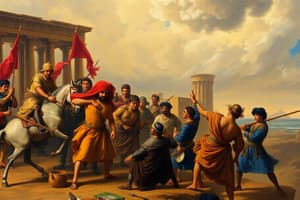Podcast
Questions and Answers
What did the term 'Hellenes' imply about the Greeks?
What did the term 'Hellenes' imply about the Greeks?
- They had a shared alien culture.
- They believed they descended from Helen of Troy.
- They were exclusively a military state.
- They had a common ancestry attributed to a legendary figure. (correct)
Which two cities primarily represented the rival leagues during the Peloponnesian War?
Which two cities primarily represented the rival leagues during the Peloponnesian War?
- Athens and Sparta (correct)
- Corinth and Thebes
- Knossos and Rhodes
- Argos and Delphi
What aspect of Greek culture did the Panathenaic festival in Athens reinforce?
What aspect of Greek culture did the Panathenaic festival in Athens reinforce?
- Political power of the oligarchs
- Religious devotion to foreign deities
- Artistic competition among city-states
- Ethnic community among the Greeks (correct)
According to Thucydides, what would happen to the perception of Sparta if they abandoned their city?
According to Thucydides, what would happen to the perception of Sparta if they abandoned their city?
Which of the following thinkers rejected the idea that gods control human events?
Which of the following thinkers rejected the idea that gods control human events?
What event is considered a dividing point between the Archaic Age and the Classical Period?
What event is considered a dividing point between the Archaic Age and the Classical Period?
Which of the following thinkers is NOT associated with the Classical Period in Athens?
Which of the following thinkers is NOT associated with the Classical Period in Athens?
What was the primary focus of Herodotus's inquiry?
What was the primary focus of Herodotus's inquiry?
Aristotle's view of the polis emphasized which of the following concepts?
Aristotle's view of the polis emphasized which of the following concepts?
Which aspect was NOT highlighted as a feature of the Classical Period's polis?
Which aspect was NOT highlighted as a feature of the Classical Period's polis?
Flashcards are hidden until you start studying
Study Notes
Persian Wars and Greek Victories
- Athenian leadership at sea and Spartan leadership on land resulted in a stunning victory over the Persians, marking a transition from the Archaic Age to the Classical Period.
- The unexpected triumph boosted Greek, particularly Athenian, self-confidence and spurred new ideas in thought, social organization, and art.
- Herodotus, regarded as the "father of history," conducted inquiries into the causes of the Persian defeat, coining the term "history" to mean "inquiry."
- The modern marathon race is inspired by the victory of 490 BC when a runner reportedly covered 25 miles to announce the win in Athens before dying of exhaustion.
Cultural Flourishing in the Classical Period
- The Classical Period, known as the Golden Age of Greece, produced influential thinkers and artists, including historians Herodotus and Thucydides, tragedians Aeschylus, Sophocles, and Euripides, and philosophers Socrates, Plato, and Aristotle.
- Most key figures resided in Athens, demonstrating the city's cultural supremacy fostered by its radical democracy.
- Other notable thinkers from different cities included poet Pindar and the atomic theory proponent Democritus, along with Hippocrates, recognized as “the father of medicine.”
The Polis and Societal Dynamics
- The polis, or city-state, reached its effectiveness during this time but revealed significant societal tensions between familial loyalty and loyalty to the state.
- Aristotle described the polis as the culmination of social evolution, emphasizing that humans are inherently political animals who achieve their potential within a polis.
- Despite internal conflicts, Greeks shared a common identity, language, and religious practices, referring to themselves as Hellenes, with a common descent from the legendary Hellên.
Conflict and Political Evolution
- Political unity among city-states was elusive; post-Persian war, they divided into rival leagues led by Sparta and democratic Athens.
- The Peloponnesian War (431-404 BC) ensued between these leagues, resulting in widespread devastation and preventing Greece from recovering.
- Thucydides noted the superficiality of Sparta’s power compared to Athens, emphasizing Spartans lived in scattered villages lacking architectural grandeur, whereas Athens's visibility obscured its true power.
Shift from Myth to Philosophy
- The Classical Period marked a turning point where Greek philosophy and history emerged as substantial alternatives to traditional mythology.
- Thinkers like Hippocrates, alongside philosophers such as Protagoras, Plato, and Aristotle, questioned mythical narratives regarding the universe's origin and nature.
- Thucydides dismissed the prior belief that gods influenced human affairs, showcasing a shift towards rationalism and inquiry-based understandings of history and existence.
Studying That Suits You
Use AI to generate personalized quizzes and flashcards to suit your learning preferences.




